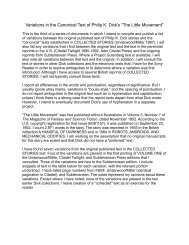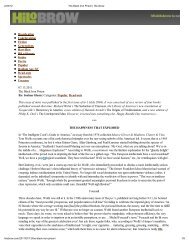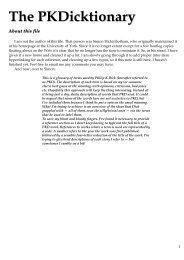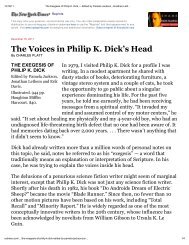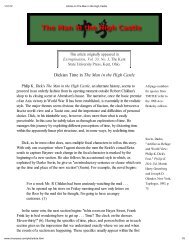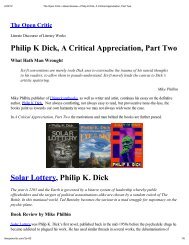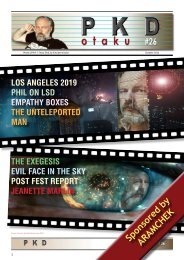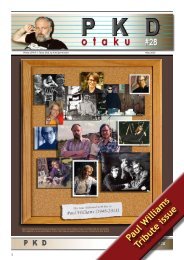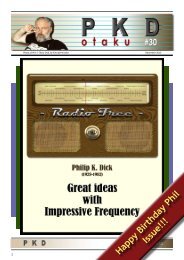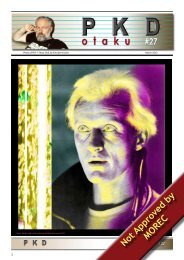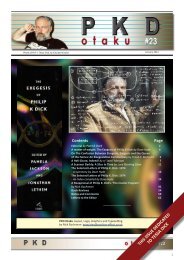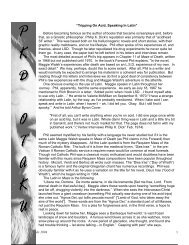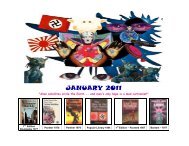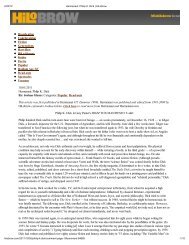The Second Coming of Philip K. Dick - Philip K. Dick Fan Site
The Second Coming of Philip K. Dick - Philip K. Dick Fan Site
The Second Coming of Philip K. Dick - Philip K. Dick Fan Site
You also want an ePaper? Increase the reach of your titles
YUMPU automatically turns print PDFs into web optimized ePapers that Google loves.
11/18/11 Wired 11.12: <strong>The</strong> <strong>Second</strong> <strong>Coming</strong> <strong>of</strong> <strong>Philip</strong> K. <strong>Dick</strong><br />
or all or none <strong>of</strong> the above. "I don't think Phil was all that interested in the morality <strong>of</strong> pre-crime,"<br />
says Goldman, an executive producer <strong>of</strong> the film. But Spielberg was, and the movie ends with a<br />
ringing endorsement <strong>of</strong> the American justice system. "It's very difficult to be true to Phil <strong>Dick</strong> and<br />
make a Hollywood movie," Goldman observes. "His thinking was subversive. He questioned everything<br />
Hollywood wanted to affirm." No matter. With the release <strong>of</strong> Minority Report, <strong>Dick</strong> became an A-list<br />
Hollywood scribe, a player, a member <strong>of</strong> the club.<br />
Art Sreiber<br />
Paycheck director John Woo made<br />
his name with violent ballets <strong>of</strong><br />
bullets; his new inspiration:<br />
Hitchcock.<br />
Vancouver, June 2003. <strong>The</strong> Paycheck shoot<br />
is well under way, and this morning Woo is<br />
rehearsing one <strong>of</strong> the opening scenes. A vast<br />
soundstage on the edge <strong>of</strong> town has been<br />
converted into the headquarters <strong>of</strong> Allcom, a<br />
company that seems to be an unholy marriage<br />
<strong>of</strong> Micros<strong>of</strong>t, Monsanto, and GE. On one side <strong>of</strong><br />
the soundstage is the bio lab, a rainforest <strong>of</strong><br />
orchids and bromeliads and water lilies and<br />
trees reaching up to the ceiling, interspersed<br />
with catwalks and robot arms. This is Uma's<br />
FEATURE:<br />
<strong>The</strong> <strong>Second</strong> Com ing <strong>of</strong><br />
Phillip K. <strong>Dick</strong><br />
PLUS:<br />
Reality Check<br />
<strong>The</strong> Metaphysics <strong>of</strong><br />
<strong>Philip</strong> K. <strong>Dick</strong><br />
<strong>The</strong> Hollywood<br />
Treatm ent<br />
domain. On the other side, behind an enormous door, is the<br />
computer lab Ben is about to disappear into. When he emerges,<br />
three years later, it will be with his memory wiped. But on his way<br />
in, he captures Uma's attention. Mischievously, she hits him with a<br />
blast <strong>of</strong> air almost strong enough to bowl him over. "I give up! I give<br />
up!" he cries, slicking back his hair. In a flash a robot arm swings in<br />
front <strong>of</strong> him, halting an inch or two from his face. In its pincers, a<br />
yellow orchid.<br />
"Don't give up," Uma says s<strong>of</strong>tly.<br />
<strong>The</strong>re are plenty <strong>of</strong> action sequences in Paycheck- a motorcycle chase through the streets <strong>of</strong><br />
Vancouver, a climactic fight scene replete with explosions, gunfire, and people diving through the air.<br />
But for Woo, that's not the point. Woo made his name in Hong Kong in the '80s with hyperviolent cult<br />
films like A Better Tomorrow and <strong>The</strong> Killer- maximum spatter rendered with balletic grace.<br />
Transplanted to Hollywood in the '90s, he graduated to big-budget action-adventure tales, most<br />
notably Face Off and Mission: Impossible 2, the second-highest-grossing film <strong>of</strong> 2000. But like other<br />
genre directors, he dreams <strong>of</strong> greater things. "Paycheck is a suspenseful movie, but also it is a love<br />
story," he says in heavily accented English while the crew preps the next shot. "Usually, science<br />
fiction movies are pretty cold. I am trying to make this one more human. Some <strong>of</strong> the scenes are a<br />
tribute to" - he claps a hand over his mouth, pretending he's afraid to utter the word - "Hitchcock."<br />
Paramount<br />
Woo cites Hitchcock - along with '30s musicals, Francis Ford<br />
Coppola, and the blood-soaked Westerns <strong>of</strong> Sam Peckinpah - as a<br />
major influence. "Hitchcock's movies are so precise," he says<br />
admiringly. "Every shot is calculated. And they're not only about<br />
suspense - I also find them very romantic." He mentions the scene<br />
in <strong>The</strong> Birds when Tippi Hedren is driving to meet Rod Taylor, a pair<br />
<strong>of</strong> lovebirds in a cage on the floor: <strong>The</strong>re are lovebirds in Paycheck,<br />
too. He mentions the scene in North by Northwest when Cary Grant<br />
is chased by a crop duster in an Indiana cornfield: In Paycheck,<br />
Affleck is chased by a train. "Ben plays an ordinary man, not a<br />
superhero," Woo says. "Just like a young Cary Grant - that's how I<br />
want him to be."<br />
"This is a part I went after really aggressively," says Affleck. "I've<br />
always been a fan <strong>of</strong> <strong>Philip</strong> K. <strong>Dick</strong>, both his writings and the movie<br />
adaptations. <strong>The</strong>y're big-budget movies for smart people." Too<br />
<strong>of</strong>ten, Affleck admits, that's an oxymoron: "<strong>The</strong>re's a tendency to<br />
www.wired.com/wired/archive/11.12/philip_pr.html<br />
4/9



